Communication and language skills are essential to your child’s healthy development. As their first role model and “teacher,” your belief in the value of language development through play is crucial.
Want an easy way to engage your child and stimulate their developing language skills? Unlock them with simple block play!
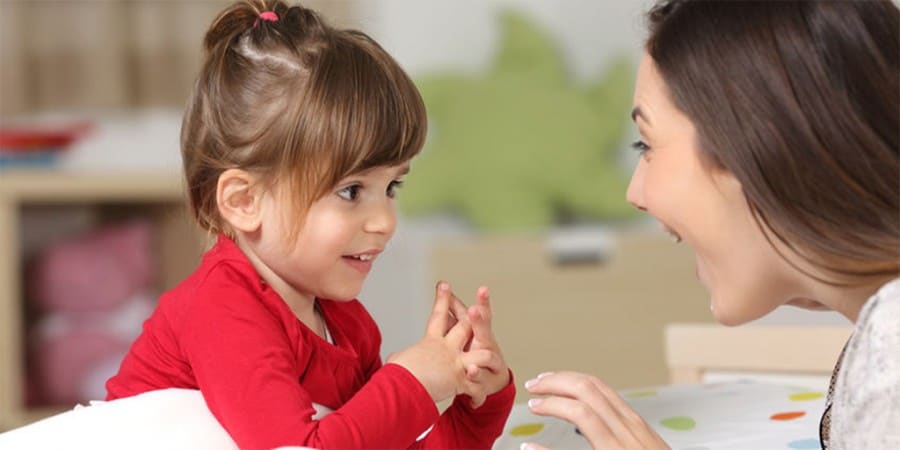
What Is Language Development In Early Childhood?
Language development in early childhood is the process your child uses to learn and understand words for communication. While professionals define early childhood as birth to eight years, we refer to language in early childhood as the first five years before formal schooling.
Language development consists of both receptive communication skills and expressive communication skills.
- Receptive language development refers to the ability to comprehend words, sentences, what is read, and what others say.
- Expressive language development includes gestures, words, sentences, and signs that are used to express meaning to others.
Language Development In Children
Effective communication enables children to connect and interact with others, which is vital to their well-being. They learn to express their emotions and understand the feelings of others.
Furthermore, good communication lays the foundation for language development and literacy, like future writing and reading skills.
Language development continues well into adolescence, but it is the most accelerated and pivotal throughout the first five years. During this stage, the brain is developing both receptive (ability to comprehend) and expressive (ability to use) language skills.
Through this rapid growth period, it is important to continue to support all the developmental areas, including the physical (both fine and gross motor development), social-emotional, language, and cognitive development.
How To Encourage Language Development
So how do you encourage your child’s language development? This is what is so exciting about language learning in early childhood. We, the parents, are the best “teachers” during this period of language development in children.
It is quite simple… take the time to read, sing, and talk with your child. Encourage them to mimic the sounds they hear. They learn quickly the more they hear the spoken word.
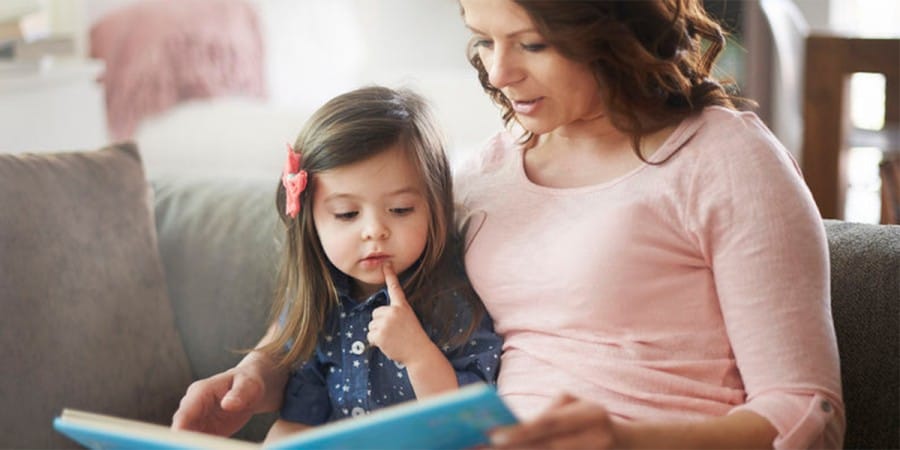
Use these Activities to support their language development skills in your everyday routines:
- Sing with them.
- Ask a lot of questions.
- Copy their sounds and words.
- Model phrases and words for them to repeat.
- Positively reinforce their communication efforts.
- Increase the vocabulary you use and grammar difficulty.
- Start conversations about what they are doing and recent events.
- Talk about their feelings and what makes them feel that way.
- Tell stories and have your child contribute to it. This also encourages their imagination and creativity.
- Expand on what they say. For instance, if your child says “block,” you can give them the block and say, ‘Here is your block.”
- Provide details about the things they see, what you are doing, and where you are going.
- Engage their participation in reading by using different voices. Ask them questions like “What is going to happen next? Have them describe the pictures.
Finally, how about some block play with wooden building blocks for kids to build their language skills?
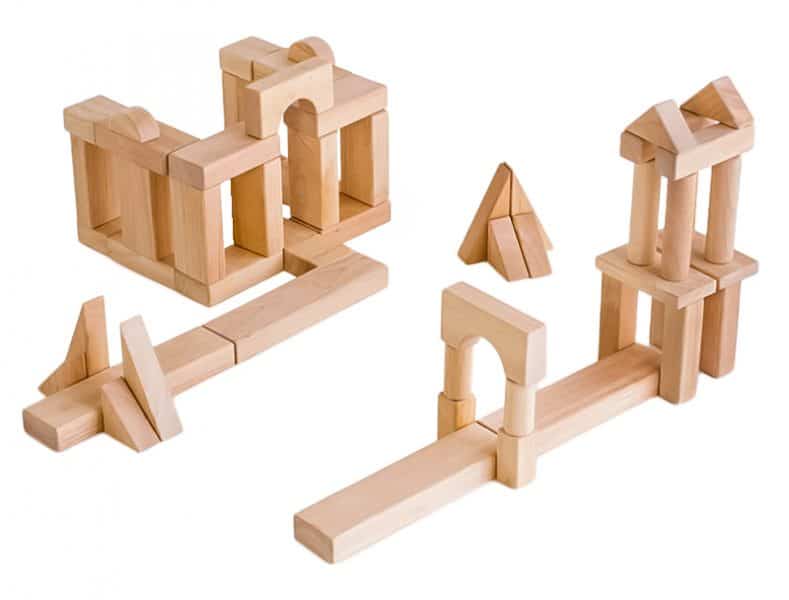
Language Development And Block Play
Your block center is the perfect place to practice language skills. Block play activities foster communication, vocabulary, and early language development.
Whether your child is narrating what they are doing or discussing the finer points of zoo-building with their friends, they are developing language skills during block play. Sit back some time and listen to your children playing with blocks. The chatter is priceless!
In addition to language progression, building with blocks encourages imaginative play. Pretend play promotes storytelling and inventing dramatic adventures.
- Maybe the zoo they just built needs more animals?
- How about a queen or a king for the castle?
As your child creates, so does the narrative, which further develops their language and communication skills.
The benefits of building with blocks are many; increasing their language and vocabulary is just one. By playing with blocks, your child learns new words, understands likenesses, differences, can communicate better, and so much more.
Building with blocks is a natural fit with your daily routine. When you take part in block play with your child, it supports language development and develops their vocabulary.
For example, they might:
- Describe the blocks’ colors, shapes, and sizes.
- Use position words such as “over,” “under,” “top,” or “bottom.”
- Name the parts of the zoo or the castle, like the “door,” “gate,” “window,” and “more.”
Add Questions To Your Block Play
During your time together playing with blocks, you can ask fun questions to enhance their language development and communication. Included are some sample questions below to get you started:
Spark their imagination and creativity with these questions:
- What did you build with your blocks?
- How did you create such a long trail?
- Can you tell me what you are building and why you chose to make it?
- What would you like to add to your blocks?
- How did you stack such a tall tower?
Talk about “same” and “different” with these questions:
- Tell me why these blocks are different.
- Do you see a block that looks the same as this block?
- What makes these blocks the same?
- What color is the block you have in your hand?
- Can you find a green block? A red block? Or a blue block?
- Which one is the large block? Or the small block?
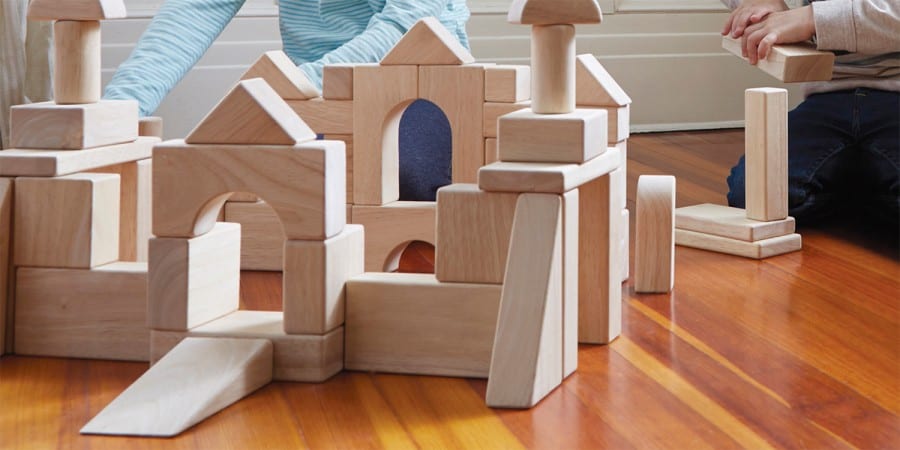
By adding these questions to your block play, you provide opportunities for vocabulary and language growth.
Language Development In Toddlers
During this language development stage, your toddler has a growing vocabulary of 50+ words by age 2. Subsequently, they appear to have a word or name for everything. Word pronunciation is getting better, and they are understandable about 50% of the time.
At the same time, their sentences are getting longer, usually two to three words in length. You will probably hear them repeat words overheard in conversations, so be careful what you say!
They can follow simple one to two-step instructions, such as, “Pick up your blocks and put them on the shelf.” While they may have a better understanding, supporting language development at this age with language and literacy activities for toddlers is meaningful.
Older toddlers are beginning to understand opposites, same and different, for example, the difference between large and small. Don’t think about teaching your toddler to talk; but instead, be present and listen.
Allow them the time to find their words. Your toddler may ask for things by naming them “monkey” or using the characteristic “silly.”
Ask them questions about their interests, make comments, and then let them respond. In return, when they ask questions, they will ask a lot of questions! Spend time finding the answer together when possible. Help them discover words to describe objects and their feelings.
Building language and literacy through play is natural for toddlers and preschoolers. Daily play and language activities for toddlers are a fantastic way to get them talking. You will likely find them singing or talking while playing.
What about toys for language progression? Some of the best language development toys for toddlers are traditional, open-ended, and battery-free.
Think of building sets, dolls, musical instruments, playdough, books, and of course, giant building blocks!
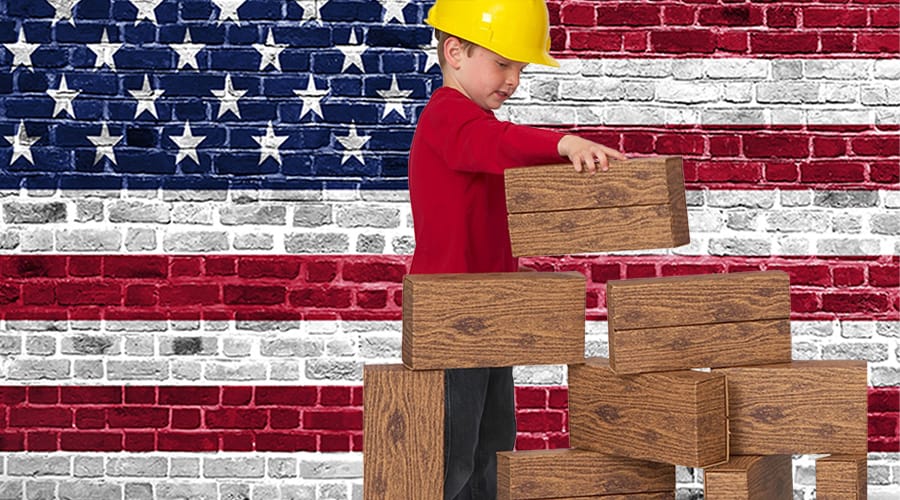
Language Development Milestones For Toddlers
Want to see what language development for toddlers will look like over the next year?
Take a look at the language development milestones chart for two to three years from The American Speech-Language-Hearing Association (ASHA).
Language Development In Preschoolers
As your toddler becomes a preschooler, communication, and language development explode. They love talking, telling stories, and sharing about their day. Their vocabulary has expanded, so they can better describe their feelings.
Your preschooler is mastering some basic grammar rules and will use more complex sentences to tell you about an event.
Play and language activities for preschoolers continue to foster speech and language development. Having fun with language is the name of the game, and you can expect some entertaining and imaginative stories.
Your preschooler will have a sense of humor and enjoy jokes, silly songs, and poems at this age. While inventive, they also understand ridiculousness like, “Are you wearing a shoe on your head?
Encourage and include play every day as a valuable component of language development for preschoolers.
- Bring out the toys for language development, like puppets, dress-up, arts & crafts, music, and wooden toy blocks.
- Preschoolers love to create and build things, so engage in block activities.
- Encourage language progression by having conversations and modeling good listening and communication skills.
- Read, sing songs, and play board games.
By age three to four, your preschooler can use their words for a variety of things. For example, they will ask for their belongings and talk about something they are doing or have done.
Their imaginative play erupts during this year, fostering imagination, creativity, language, and social-emotional development.
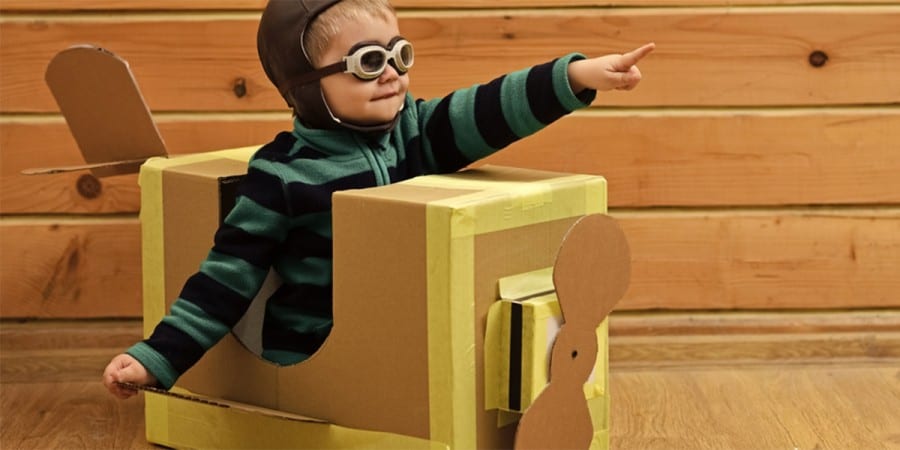
Language Development Milestones For Preschoolers
Want to see all the amazing things you can expect from your preschooler?
Check out this language development milestones chart for three to four years from (ASHA).
Language Development In Older Preschoolers
At ages four and five, your preschooler’s vocabulary has evolved. Their understanding of grammar is better; their sentences are more detailed and longer, usually 5 or more words.
Older preschoolers speak fluently, in an easy to listen to voice, and are understandable 90% of the time. They can answer simple questions and follow directions up to 4-steps.
Typical language development at this age means preschoolers can comprehend most of what they hear. They are better able to communicate with adults and other children. You might see them engage in conversation with strangers when out and about with you.
You can be sure their stories become more imaginative, longer, and use “grown-up” grammar. They love to make rhymes, sing a song, or say a poem from memory such as “Itsy Bitsy Spider” or “Wheels on the Bus.”
Explore this language development milestones chart for four to five years from (ASHA).
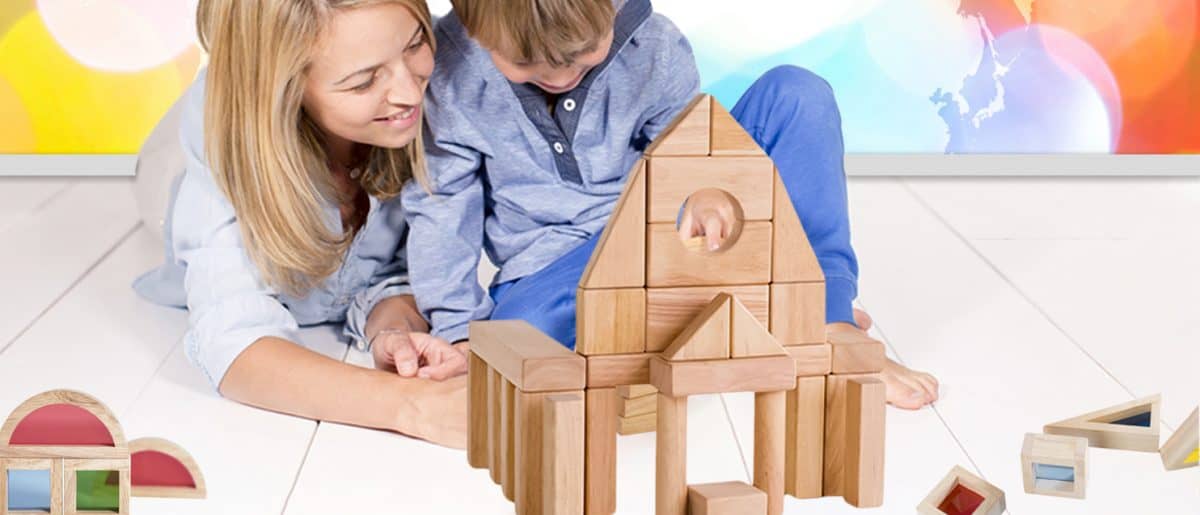
Do you remember the first time your toddler said “mama” or “dada?” Didn’t it just warm your heart? Well, a child’s relationship with a trusting and caring adult is essential to supporting language development.
So grab a set of wooden building blocks for some quality block play together!
